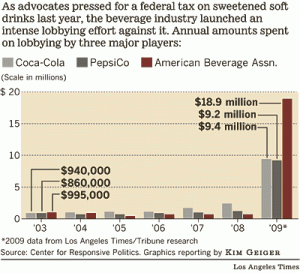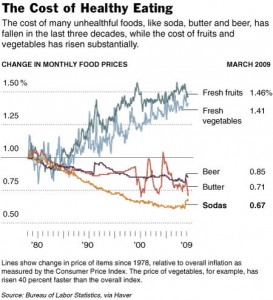Tools for promoting soda taxes
I’ve been collecting information about soda taxes. If you think they are worth a try, as I do, and want to help get the New York bill (the Duane Bill) passed, plenty of background information and tools are available.
Tomorrow, March 8, The New York Academy of Medicine, the New York State Healthy Eating and Physical Activity Alliance, and the New York State Public Health Association invite you to a symposium:
TAKING ACTION AGAINST OBESITY:
A Sugar-Sweetened Beverage Tax for New York State
Monday, March 8 2010 from 2:00 pm to 3:30 pm
Blue Room, 2nd Floor, Capitol Building, Albany, NY
Speakers include NYS Health Commissioner Dr. Richard Daines, New York City Health Commissioner Dr. Tom Farley, and Dr. Kelly Brownell from the Yale Rudd Center for Food Policy. The event is free. RSVP to tsanders@malkinross.com
Here’s more than you ever wanted to know about why these taxes are likely to do some good and are worth passing:
- Dr. Daines’ editorial supporting the bill.
- A handy Q and A on the taxes.
- Advertisements from the Alliance for a Healthier New York.
- Talking Points for writing letters.
- More talking points from the New York State Healthy Eating and Physical Activity Alliance.
Convinced? Want to help?
- Sign the Statement of Support.
- Join Legislative Visits on Wednesday, March 17, in Albany. Contact agarcia@nyam.org to sign up.
- Send a letter to your representatives. Citizen’s Committee for Children has a produced a letter-generator for this purpose.
- Write a postcard using this prototype..
And just for fun, here is testimony from an official of PepsiCola opposing the taxes and a rebuttal from some group (sorry, I don’t know which).
Finally, the Los Angeles Times (February 21) had a  terrific graph of the recent sharp increase in lobbying expenditures (in the rebuttal). Given the mess in Albany, it will be interesting to see how all this goes. Act now!
terrific graph of the recent sharp increase in lobbying expenditures (in the rebuttal). Given the mess in Albany, it will be interesting to see how all this goes. Act now!


